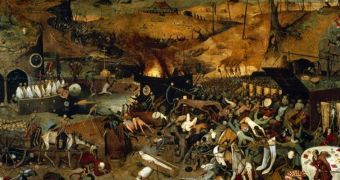A recent investigation whose findings were published in the journal PLOS ONE this past May 7 revealed that, as surprising as this may sound, the Black Death that hit Europe in the 1300s did come with some perks.
Thus, researchers claim that, according to evidence at hand, life expectancy in the regions devastated by the Black Death increased in the aftermath of this plague.
What they mean is that, following this horrific episode in history, Europeans found themselves living longer than they did before the Black Death's making an appearance in this part of the world.
In the paper in the scientific journal PLOS ONE, the specialists who carried out this investigation explain that in the years preceding the plague, just 10% of people lived past the age of 70.
Following the plague, however, the number of people who lived to reach the age of 70, maybe even longer, increased and reached 20% of the general population, Live Science informs.
This conclusion is based on data collected while examining bones found in cemeteries in London. Of these bones, some belonged to people who lived before the Black Death, and others came from folks who lived in the centuries following the plague.
Specialist Sharon DeWitte with the University of South Carolina in the United States and fellow researchers explain that, as shown by previous studies, the elderly and those already in poor health were the ones most vulnerable to the Black Death.
This means that the plague might have helped increase life expectancy in Europe by taking out the weak and leaving behind a hardier population, whose descendants were better equipped to deal with environmental stressors and live to reach a fairly impressive age.
Then again, it is also possible that the life expectancy of Europeans increased in the aftermath of the Black Death due to the fact that, since the plague killed millions of people, survivors had more resources available.
Otherwise put, it is possible that the Black Death led to an improvement in living conditions, especially dietary quality, in Europe, and consequently made it possible for the people who survived it to live better and longer, the specialists explain.
For those unaware, the medieval Black Death hit Europe between the years 1347 and 1351. It killed somewhere between 75 and 200 million people, i.e. about 30 to 50% of Europe's entire population, and it is considered to be one of the most devastating epidemics in human history.

 14 DAY TRIAL //
14 DAY TRIAL //